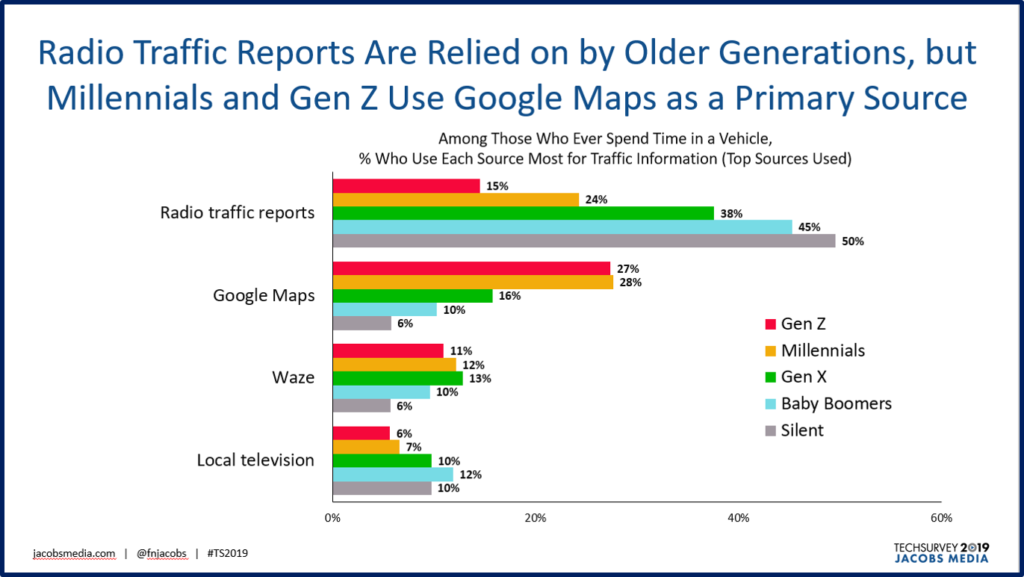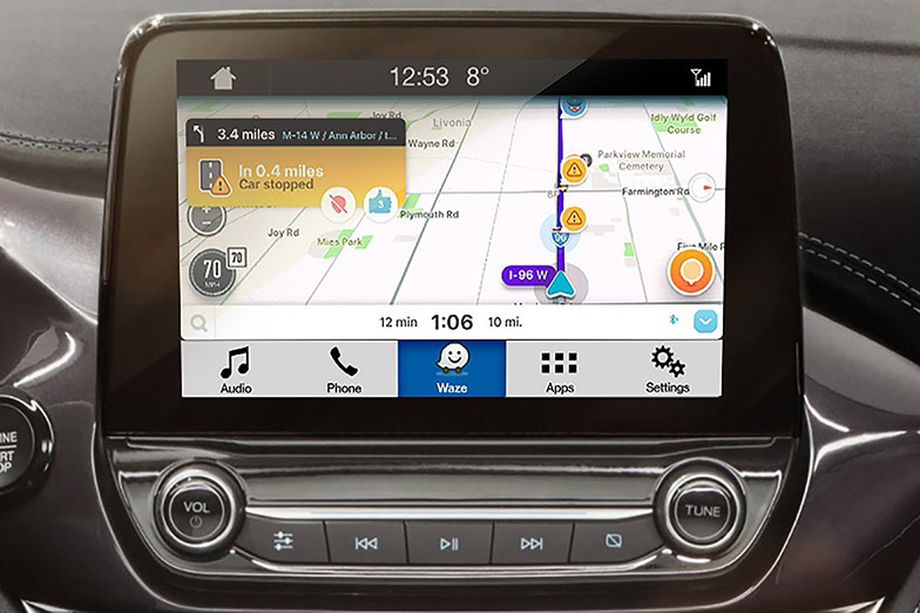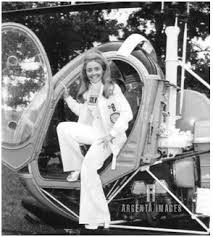
I attended the Voice of the Car Summit last month where a couple hundred very smart, tech-savvy people gathered to talk about the power of “voice.” Along the way, they’re doing research about cars and driving. And some have discovered that typical commute times create opportunities when lots of consumers are in their cars.
Seriously? Even first-year radio students know about the power of drive time, but these technologists are just beginning to wrap their heads around the times when “voice” will become an even bigger factor as drivers motor to and from work.
I participated in a panel discussion, and when I made the statement, “In radio, bad traffic is our friend,” it drew many laughs. That’s because many of the attendees have always thought of traffic as a nuisance or the price you pay for living in a big city.
In radio, we think of heavy traffic as a gift – providing a daily captive audience and lots of TSL. It’s why long commute times in markets like D.C., San Francisco, Chicago, New York, L.A., and others have always been a positive ratings factor for local News/Talk stations. From the minds of some of those early programmers at CBS and Group W came the News/Talk clock many commuters know by heart, featuring “traffic and weather together at the 8’s” (or at other fixed positions several times an hour).
And for decades, that dashboard radio was the only place drivers could get consistently reliable traffic information – that is, until the advent of the smartphone and traffic apps. Google Maps, Waze, and others now provide routing information in real time. They are detailed, giving drivers information about disabled vehicles, as well as nearby cops looking for speeders. And in the process, radio’s reputation for reliable traffic information has been gradually diminishing.
We saw this in this year’s Techsurvey, where only four in ten respondents rely on radio traffic reports. Just a few years ago, a healthy majority turned to an AM or FM station as their first source for road information.
Remember most of our respondents are radio listeners, many of whom are members of email databases. So, when they start leaving the AM/FM band to get traffic information, it’s concerning. This is especially the case among younger generations in our survey – Google Maps has become their go-to choice. Waze is also becoming a significant factor. (Not surprisingly, Google bought Waze back in 2013, integrating its data in Google Maps.)

This sends an obvious message to radio – modernize your traffic reports or be prepared to lose yet another battle to digital sources.
At the NAB in Vegas last month, a panel called “The Personalized Future of In-Vehicle Entertainment” featured Adam Fried, head of global partnerships at Waze. A story in Inside Radio reported that collaborations with audio companies like TuneIn and iHeartRadio are becoming more common, providing much-needed, real-time, personalized traffic information.
Automakers are taking control as well. Ford announced last year Waze integration with vehicles equipped with their SYNC 3 operating system. Recent TV commercials for the automaker prominently show Ford touting the Waze app on their touchscreens.

So, we shouldn’t be surprised that Entercom’s Radio.com announced a new partnership with Waze yesterday. As Entercom’s SVP/GM Fred Bennett noted in AllAccess, “Partnering with Waze will allow us to offer more powerful real-time traffic updates to our audience. By integrating new technologies into our on-air and digital traffic reporting, we will be able to better serve our communities and continue to offer them the most robust local traffic information they need to plan their day.”
Let’s not forget that Entercom now owns some of the biggest and best All News stations in the country, thanks to their purchase of CBS. But it should be noted these Waze tie-ins are with apps – iHeartRadio, Radio.com, and TuneIn.
 The first of these integrations we knew about with Waze and broadcast radio’s WTOP, about five years ago. We blogged about it in 2015, an early attempt to differentiate its radio traffic reports and give them an edge.
The first of these integrations we knew about with Waze and broadcast radio’s WTOP, about five years ago. We blogged about it in 2015, an early attempt to differentiate its radio traffic reports and give them an edge.
It’s a positive companies like iHeartMedia and Entercom are bolstering their apps with Waze integration, but what about the on-air traffic product?
For the millions still listening to the radio in their cars – the broad majority of Americans – integrations with a player like Waze shouldn’t just be delivered via apps. It should be used as foundational information with which to provide on-air radio traffic reporters with better data.
That said, all the digital navigation info in the world isn’t going to make broadcast radio traffic reports more interesting or entertaining. Once again, that comes down to the personality of these reports. And when radio is on its game, traffic reports can be more than mundane service elements that carry advertising.

Back in the day, radio traffic reports were actually entertaining, presented by clever, interesting people broadcasting live from helicopters and small planes. Whether it was go-go boot wearing Jo-Jo Shutty at CKLW in Detroit, or the clever joking of KMBZ’s John Wagner, branded as the “Sky Spy” flying all over Kansas City, these reports were entertaining and often turned into moments commuters and other listeners looked forward to. That was a long time ago. Today, radio traffic reports couldn’t be duller or more pedestrian.
As Waze’s Fried noted at the NAB, “audio is not our expertise.”
No, that’s what those of us in broadcast radio are supposed to be good at. Presenting interesting, compelling, and even entertaining reports – integrated with more reliable information – ought to be right up radio’s alley.
Executed well, it could be the best of both worlds for broadcast radio. Given the importance of the car to the medium, that’s a goal worth striving for.
For radio, there’s trouble up the road if the industry doesn’t act to work around it.
- What To Do If Your Radio Station Goes Through A Midlife Crisis - April 25, 2025
- A 2020 Lesson?It Could All Be Gone In A Flash - April 24, 2025
- How AI Can Give Radio Personalities More…PERSONALITY - April 23, 2025




“Back in the day, radio traffic reports were actually entertaining, presented by clever, interesting people ….. Today, radio traffic reports couldn’t be duller or more pedestrian.”
As a radio traffic reporter (or soon-to-be kinda former as I’m heading to a great situation at Westwood One News) I made my living entertaining as a traffic reporter. The NY Post once called me “an interesting mix of Don Pardo & a Town Crier.” I’m also one of the very few radio traffic reporters with his own “branding” – The McKay Way – and I’ve trained others to do the same.
Fred is 1000% right in comments & observation – in many “Waze” we in radio have forgotten that it is our JOB to “inform & entertain,” and traffic reports & all aspects of radio should be no different. It is our JOB to tell the story, visual in an audio world, theater of the mind. What’s the difference between music radio stations as opposed to Spotify & Pandora – the DJ’s – human beings who are supposed to inform & entertain us. What’s the difference between a traffic app and a radio station traffic report – the traffic reporter – human beings who are supposed to inform & entertain us. What’s the difference between an all-news radio station and an all-news app – the news anchor & reporter – human beings who are supposed to inform & entertain us.
I’ve been doing traffic and made my radio name doing it for 30 years, and in that time technology has come along but radio is still here – and it will still be here despite smartphones and tech apps if we can all remember what made radio great – personality, telling the story, being the companion, informing, entertaining, and putting the listener first.
Even though I’m heading to news now, that very same philosophy will stay with me – and should be a part of any of us who crack open a microphone, roll up our sleeves, get our hands dirty, and get paid to have fun each day.
Jeff, thanks for the kind contents & reminding us there are still some exceptions to the rule. Those basic branding lessons we learned in our formative years (I LOVE “The McKay Way”) hold true today. It’s just that too many broadcasters are mailing it in, not taking the opportunity to both stand out and entertain. Good luck in the new venture and thanks again for your insightful observations.
I agree unfortunately that there are some who indeed “mail it in.” However, the opportunities while not like they were 2 decades ago are still out there and there’s still people who’d yank their own molars to be behind a microphone.
I appreciate the kind words. It’s going to be a new adventure for me and I’m looking forward to the challenges. If you ever need someone for a traffic panel I’m game…..
Fred, I do have a question regarding reporting traffic today as opposed to the traffic personalities before GPS: how do you make the report informative and entertaining without offending everyone? Our guy, Sky Shark, at 1065 The End back in the 90’s, could talk about a “Car-B-Q” and other incidents with a bit of humor, and it was all good. Today, you’d get reamed for “making fun of a horrible accident”. (and Heaven forbid you pronounce a street wrong!) Would love some suggestions as I report the traffic every day on our medium market morning show. Thanks!
I’ll give you one Charley reporter to reporter – just have fun. You can’t make fun of a car crash, but you can interject when the crash has been out there for 90 minutes or longer – that’s when I’ve been known to say “This wreck has been out there so long they could apply for citizenship.” We have a road in NYC called the Brooklyn-Queens Expressway (BQE) – when it’s jammed I say “The BQE now stands for Better Quickly Exit because….” It’s that little humor people remember and begins to set you apart from other reporters. You can’t do it in every report but pick your times. Just remember that no matter the station or market, if you sound boring and just reading info the listener will tune you out, but if you sound like you’re into it and tell a story, the listener will be into it too. Feel free to reach out to me anytime – my email is [email protected].
Great advice, Jeff! Thank you!
Charley, Jeff McKay beat me to the response – I agree with him. It’s not ncessarily about the reports themselves, but the way the traffic personality connects with commuters, the station’s personalities, and the community. You can become a bona fide personality in the market, no matter what role you play.
Thank you, Fred!!
Yup.
Waze is my go-to on those 1-hour Boston commutes, Fred.
I love the idea of Waze being integrated with local radio…it’s smart and adds even MORE credibility! Glad to see this happening.
I agree, JC. Thanks for the comment.
Traffic reports. Ugh. You couldn’t make me punch that button more quickly. I live in the shadow of the worst traffic situations in the country (maybe the world) – and yet no one has been able to deliver a traffic report that’s more exciting than reading the menu at Mc Burger’s. “The left side of the..” “The right side of the…” “Vehicle”. “Single Vehicle Accident”. “We’re getting reports of…” Really? Someone has told these people to “find the accidents and read the list”. Most stations these days are staffed by people who are getting their feet wet in the business and getting no guidance along the way. The reporters have five or six stations to hit-and they spend more time recording and editing them than preparing them in a sensible manner. Not their fault. No one told them. The general public impression of a “reporter” is Ron Burgundy. In our market and nearby markets there are news “reporters” who get it and when they can add personality into their reports. Why can’t they pass that knowledge on to traffic reporters? Fact is when “broadcasters” give traffic reports, they become “narrowcasters”. Fender-bender 15 miles away? I don’t care. A major 80 car pileup is NEWS. It should be treated as such. Most of the reports we hear today are just fillers before the :15 spot that runs at the end…with no forethought into making them listenable by everyone. It’s a shame – but we’re asking apps like Waze to take over that navigation job. Does anyone listen to Howard so they can get the latest traffic?
They are as dull as dirt, Dave, and certainly not good for TSL. It’s about the revenue, especially on music stations where these reports have little-to-no value. Appreciate the comment.
Wondering if integrating Waze data – likely mentioning it on air as the source of traffic info – will eliminate completely the need to have traffic data gathering operations.
Humans no longer needed to monitoring police scanners, video feeds, compile phoned in reports…
This could mean the end of Total Traffic. If not, staff reductions are certainly inevitable.
Jeff, it’s like everything else with technology and radio – disruption, and changing roles. Someone has to manage this stuff, not to mention the personality piece. But my concern is that if radio does nothing, these reports will dry up and become as useless as those old school closing reports.